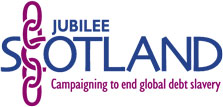 |
||
| Take action on your own |
| Join a local group |
| Call for Change Campaign |
| Encourage your organisation |
| Join our mailing list |
| Volunteer |
| Donate |
Debt Relief for Ethopia and Niger in Doubt - Take Action
Jubilee
Scotland has learned that the USA and Germany are blocking the World Bank
and IMF's ‘top-up’ debt relief for Ethiopia and Niger on the
basis of a mere technicality. This could cost Ethiopia $35 million per
year. Worse, if the USA and Germany are successful, the same technicality
could be used to block urgently needed top-up relief for other countries.
Please send an email to the USA and/or German representatives on the World
Bank and IMF. We need you to demand that the rules for topping up be adhered
to, and that critically-needed debt relief be delivered to Ethiopia, Niger
and other poor countries.
SAMPLE EMAIL:
Dear
Etc.,
Debt
relief rules say that countries that haven’t received enough debt
relief to make their debts ’sustainable’ should get top-up
relief. I have been informed that some countries, like the USA and Germany
are trying to block this. This will hit poor countries like Ethiopia and
Niger (whose cases are currently under consideration) very hard. For example:
- Loss of top-up relief will cost Ethiopia $35 million p.a.
- Ethiopia is currently very vulnerable economically, due to the low price of coffee (its major export), and cannot afford to lose the expected extra relief.
- Almost half of Ethiopia’s 70 million people live below the poverty line – it is they who will pay for the USA and Germany’s attempt to change the rules.
Please ensure that the World Bank and IMF stick to the rules on topping up and make sure that poor countries get the urgent debt relief for which they have qualified.
Yours,
Send
your emails to:
USA - Carole Brookins cbrookins@worldbank.org
Germany - Eckhard Deutscher edeutscher@worldbank.org
United
Kingdom - Tom Scholar tscholar@worldbank.org
More
Details
Ethiopia
and Niger are two of the world’s poorest countries, and have met
virtually all of the conditions necessary to get debt relief under the
Heavily Indebted Poor Countries Initiative (HIPC). However, it has long
been recognised that even after this debt relief, their debts will not
be ‘sustainable’, according to the World Bank and IMF’s
own criteria for debt sustainability. In other words, the ratio of debt
to exports will still exceed the 150% ‘sustainability threshold’,
even after debt relief. Normally this would lead to the two countries
getting ‘top-up’ relief to bring the debt down further, so
that the 150% ratio is met.
The
USA and Germany are blocking this, saying that the fact that Ethiopia
and Niger’s debt ratios exceed 150 is simply because interest rates
are currently low (see below) – which they say doesn’t matter.
On the other hand, Jubilee Scotland's information is that the UK Government
rightly sees low interest rates as an indication of low inflation, which
means the real value of poor country debts will remain high (just as,
on the other hand, high inflation erodes the future value of money). For
this reason, all eligible countries should receive extra relief.
Jubilee
Scotland believes that these arguments over interest rates simply reinforce
our view that the World Bank and IMF’s method for calculating debt
sustainability are fundamentally flawed. The real issue is whether poor
countries can afford to make any debt repayments when they are in grave
danger of not meeting the internationally-agreed 2015 Millennium Development
Goals. If there is to be a realistic chance of eradicating poverty in
poor countries, then the entirety of their debts should be written off.
Topping up the debt relief they are due would be an important step towards
this outcome.
Technicalities
Why
are the USA and Germany taking this stance? It all revolves around interest
rates. When assessing the amount of debt a country has, its future debt
repayments are 'discounted' to give what is known as the Net Present Value
of the debt (NPV). This is the debt value that is used in the debt:export
ratio calculations. If rates are high, the discount is greater, and the
NPV is lower. Thus the debt:export ratio is reduced, making debts more
'sustainable'. However, if rates are low, the discount is less, the ratio
grows and debts become less 'sustainable'.
Interest rates are currently low, leading to high debt:export ratios –
around 200% - being calculated by the World Bank and IMF for Ethiopia
and Niger.
The USA and Germany say this doesn’t matter as the annual payments
don’t really change (the real interest paid on poor country debts
is well below market values). The UK and others say that it does matter,
as low interest rates reflect low inflation, therefore the future value
of debts is upheld. Moreover, low interest rates indicate low growth,
reducing poor country income, and thus their ability to service debts.
For these reasons, Jubilee Scotland believes the World Bank and IMF should
stick to treating debt:export rations of greater than 150% as ‘unsustainable’
and, sooner rather than later, move to an approach to debt sustainability
that is focussed on the need to meet the Millennium Development Goals.
Further details are available from Jubilee Research at www.jubileeresearch.org
| © 2004 Jubilee Scotland | |